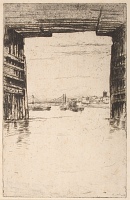Under Old Battersea Bridge | ||
| Number: | 168 | |
| Date: | 1876/1878 | |
| Medium: | etching, drypoint and open bite | |
| Size: | 216 x 139 mm | |
| Signed: | no | |
| Inscribed: | no | |
| Set/Publication: | 'Cancelled Plates', 1879 | |
| No. of States: | 3 | |
| Known impressions: | 24 | |
| Catalogues: | K.176; M.173 | |
| Impressions taken from this plate (24) | ||
KEYWORD
barge, bridge, church, river.
TITLE
There are a few minor variations in the title, as follows:
'Under Old Battersea bridge' ([1876/1879], Whistler). 1
'Under Old Battersea Bridge' (1881, Union League Club). 2
'Under Old Battersea Bridge' (1886, Frederick Wedmore (1844-1921)). 3
Possibly 'Old Battersea - Bridge - No. 2' (1890/1892, Beatrice Whistler (1857-1896)). 4
'Under Battersea Bridge.' (1905, ISSPG). 5
'Under Old Battersea Bridge' (1909, Howard Mansfield (1849-1938)). 6
'Under Old Battersea Bridge' is clearly Whistler's original and preferred title.
'Under Old Battersea bridge' ([1876/1879], Whistler). 1
'Under Old Battersea Bridge' (1881, Union League Club). 2
'Under Old Battersea Bridge' (1886, Frederick Wedmore (1844-1921)). 3
Possibly 'Old Battersea - Bridge - No. 2' (1890/1892, Beatrice Whistler (1857-1896)). 4
'Under Battersea Bridge.' (1905, ISSPG). 5
'Under Old Battersea Bridge' (1909, Howard Mansfield (1849-1938)). 6
'Under Old Battersea Bridge' is clearly Whistler's original and preferred title.
2: New York 1881 (cat. no. 150).
3: Wedmore 1886 A (cat. no. 280).
4: List, [1890/1892], GUW #12715.
5: London Mem. 1905 (cat. no. 280).
6: Mansfield 1909 (cat. no. 173).
DESCRIPTION
A single span of old Battersea bridge showing two wooden piers framing a view of the river with several boats and barges. Beyond them is a suspension-bridge and, on the right, houses and a church tower.
SITE
Battersea Bridge crosses the river Thames in London, between Chelsea and Battersea. The view appears to show the two piers to left (when heading upstream) of the central passage under old Battersea Bridge, which appear (in reverse as printed) at the far right of the etching Old Battersea Bridge [188]. Chelsea old church and the shore near Whistler's house in Lindsey Row are seen on the right in the etching, and the Albert Suspension Bridge appears on the left.
The old timber Battersea Bridge dated back to 1771-1772, and was built by John Philips under the direction of Henry Holland. In 1879 it was described as 'one of the old-fashioned timber structures, which will before long have to be removed and a new bridge built in its place.' 7 The old bridge was closed to traffic in 1883 and demolished in 1890. Sir Joseph Bazalgette's bridge was built to replace it, between 1886 and 1890.
7: 'Freeing the Bridges', The Times, London, 24 May 1879, p. 12.
DISCUSSION
Between 1859 and 1879 Whistler portrayed the old bridge in drawings, etchings, lithographs, lithotints, paintings, as well as on a folding screen and on a wall in his house in Chelsea. Whistler's studies were drawn either from a boat or the shore or from a jetty near his house on Lindsey Row in Chelsea. A more extensive view of the bridge appears in Old Battersea Bridge [188] (reproduced below).
Single piles supporting a section of bridge (making a T-shaped composition) appear in several drawings, The new Albert Bridge, seen through old Battersea Bridge [m0480], A span of old Battersea Bridge [m0481], Old Battersea Bridge [m0482] and Nocturne: Battersea Bridge [m0485], and these also relate to Blue and Silver: Screen, with Old Battersea Bridge [y139]. The most famous of the T-shaped compositions is the oil painting, Nocturne: Blue and Gold - Old Battersea Bridge [y140], which dates from the early 1870s, and reflects the strong influence of oriental prints.
Old Battersea Bridge [m0700] and The Tall Bridge [m0701], dating from 1878, are chalk studies for two lithographs, The Broad Bridge [c011] and The Tall Bridge [c012] respectively. The Tall Bridge (reproduced above) is most closely related to this etching, Under Old Battersea Bridge. However, the etching simplifies the structure of the bridge, while leaving the distance more detailed, if slightly thin and insubstantial, by contrast.



